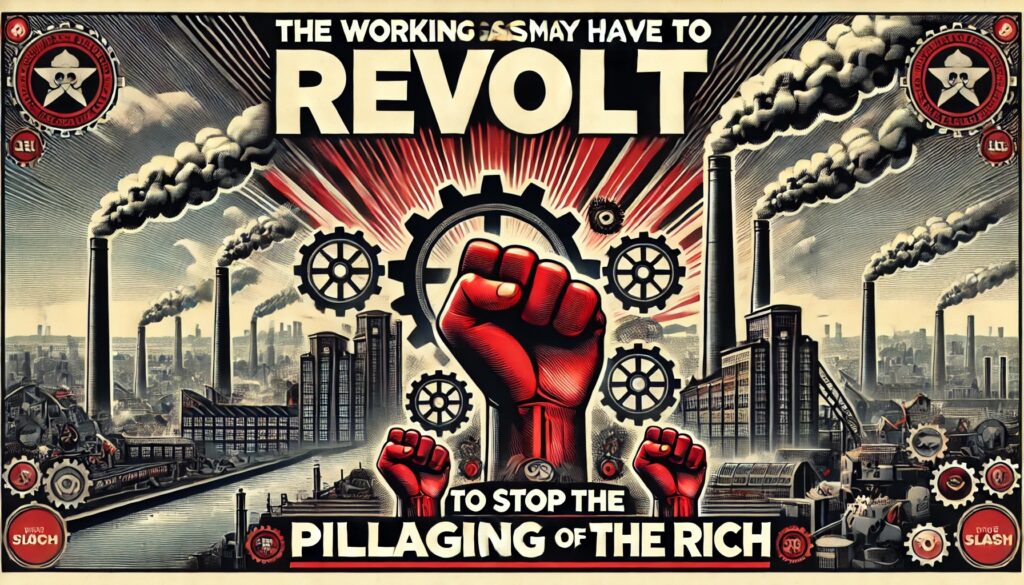The Les Leopold article “Pillaging by the Super-Rich Will Continue Until the Working Class Revolts” clarifies that the working class must take control of its economic well-being.
The working class may have to revolt.
Podcasts (Video — Audio)
The working class‘s narrative has often been one of struggle, resilience, and sporadic bursts of rebellion against the forces of economic oppression. Today, as the wealth gap widens and the influence of the super-rich expands, it becomes increasingly evident that another chapter in this saga is unfolding. This post encapsulates a growing sentiment among the working class: the rich are pillaging their livelihoods, and the time for revolt may be imminent.
The Pillaging of the Working Class
The notion that record profits for corporations translate to a better economy for all is a myth that has long been debunked. Instead, these record profits often reflect the exploitation of the working class. The working class toils harder yet sees no proportional wage increase or improvement in working conditions. This dynamic is evident in the food industry, where giants like General Mills, PepsiCo, and Tyson have continuously jacked up prices under the guise of supply chain issues and rising labor costs. However, the reality is that these companies have manipulated supply and demand to create artificial shortages, thereby justifying price hikes. This corporate greed masquerades as an economic necessity, leaving the working class bearing the brunt of inflated prices.
The Illusion of Economic Recovery
The COVID-19 pandemic provided a stark illustration of how dependent the corporate world is on consumer spending. Corporations panicked as people stayed home and reduced consumption, revealing their vulnerability. This moment should have been a wake-up call for the working class, highlighting their collective power. Yet, the return to “normalcy” saw the resumption of pre-pandemic exploitation, with corporations resuming their profiteering strategies. Progressive voices like those at Common Dreams have been vocal about these issues, urging the working class to recognize their power and mobilize against these injustices.
The Role of Misinformation and Division
One of the strategies employed by the super-rich to maintain their stranglehold on power is the deliberate dissemination of misinformation and the fostering of division among the working class. This tactic prevents a unified front that could challenge the status quo. The former President, Donald Trump, epitomizes this phenomenon. Despite his numerous transgressions against the working class, he managed to secure their support by positioning himself as an outsider willing to shake up the system. His actions, from dubious business practices to misleading statements about his wealth, showcase the impunity enjoyed by the elite, further demoralizing those who suffer under their rule.
The Economic Manipulation by the Rich
The economic manipulation extends to various sectors, including housing and healthcare. Wall Street firms have been buying homes and converting them into rentals, thus increasing housing costs. This practice creates a false scarcity that benefits corporate landlords at the expense of prospective homeowners. Similarly, big pharma continues to charge exorbitant prices for medications in the U.S. while offering the same drugs at lower prices abroad. This discrepancy highlights a system rigged in favor of the rich, with the government complicit in perpetuating these injustices through subsidies and tax breaks.
The Fallacy of Corporate Welfare
The concept of corporate welfare is perhaps the most egregious example of the system’s inherent flaws. Taxpayers’ money, which could be used to improve public services and infrastructure, is funneled into already wealthy corporations’ coffers. The oil industry, for instance, receives billions in subsidies annually despite recording massive profits and engaging in stock buybacks that benefit only the wealthiest shareholders. This practice does nothing to enhance the value of the companies or benefit the working class; it simply enriches those at the top.
The Path Forward: A Call to Revolt
Given these realities, the call for a working-class revolt is not just rhetoric but a necessary step toward reclaiming economic justice. The working class must recognize their collective power and the impact of their consumer choices. Reducing consumption, boycotting exploitative corporations, and advocating for policy changes that address these systemic issues are all viable strategies. The historical trust in the federal government has eroded, largely because it has consistently prioritized corporate interests over those of the people. This distrust underscores the need for grassroots movements that can hold both corporations and the government accountable.
Conclusion
This article presents a microcosm of a larger, brewing discontent. The working class is waking up to the reality of their exploitation and the need for collective action. The path forward requires solidarity, informed activism, and a willingness to challenge the entrenched powers that have long undermined their well-being. The super-rich may continue to pillage, but a unified working class has the potential to stop them and create a more equitable society.
Viewers are encouraged to subscribe and join the conversation for more insightful commentary and to support progressive messages. Together, we can populate the internet with progressive messages that represent the true aspirations of most Americans.

